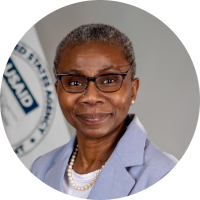Comparing US and Chinese Business Models in Africa
On November 15, 2016, the Wilson Center Africa Program hosted a panel discussion on “Comparing U.S. and Chinese Business Models in Africa,” as part of the Brown Capital Management Africa Forum. The event featured four speakers, Ambassador David Shinn, Professorial Lecturer at The George Washington University and former U.S. ambassador to Burkina Faso and Ethiopia; Mr. Scott Eisner, President of the U.S.-Africa Business Center and Vice President for African Affairs at the U.S. Chamber of Commerce and a member of the Advisory Council of the Wilson Center Africa Program; Ms. Rahama Wright, Founder and CEO of Shea Yeleen and a member of the President’s Advisory Council on Doing Business in Africa (PAC-DBIA); and Dr. Heiwai Tang, a professor of international economics and political economy the Johns Hopkins School of Advanced International Studies. Together, they examined the changing trends in Chinese business relationships with Africa, compared the business models of U.S. and Chinese companies on the continent, and made recommendations for improving the United States’ economic relationship with Africa.
Ambassador David Shinn opened discussion by asserting that China and the United States share four similar strategic objectives and may share a fifth in the near future. Specifically, the United States and China both aim to acquire access to Africa’s natural resources, gain access to African markets, gain African support for their political objectives in international fora such as the United Nations, and address security threats including terrorism, narcotics, and piracy that threaten their interests. He also noted that the two countries also have some unique strategic objectives: given its security concerns, the United States seeks to acquire locations to establish military bases, while China is interested in garnering diplomatic recognition by all 54 African (3 currently recognize Taiwan instead). These roles may further align: Ambassador Shinn and Dr. Tang concurred that the Chinese government is likely to expand its role as a leader in world politics, including as a security provider and peacekeeper. There are also operational differences: while U.S. companies operating on the continent are private sector firms Chinese companies are state-owned enterprises that get public financing and are supported directly by the state, for instance with business deals packaged with Chinese government aid. In terms of policy responses, he emphasized that the United States can do more to support American companies abroad with financing from the Export-Import Bank and boosting commercial support at U.S. embassies in Africa He also said that the United States has seen success in challenging certain Chinese economic practices in cases before the World Trade Organization, and recommended that the U.S. government continue to do so.
Mr. Scott Eisner built on Ambassador Shinn’s analysis and provided a private-sector perspective on U.S. government support to U.S. companies seeking to do business in Africa. Mr. Eisner asserted that the U.S. and Chinese economic models in Africa aren’t comparable, given China’s command-and-control societal and government structure. U.S. economic engagement in Africa is dominated by the private sector, while many of the Chinese companies doing business there are state-owned enterprises that receive much more direct government support. Despite that, Mr. Eisner said that the U.S. government can do a great deal more to coordinate inter-agency cooperation to support U.S. businesses, and he recommended the creation of a single point of contact on U.S.-Africa business affairs within the government. He acknowledged the effective support several agencies provide to the private sector, including the Office of the United States Trade Representative, the Commerce Department’s Commercial Service, and U.S. embassies, but said that support across the U.S. government for U.S. companies in Africa is often insufficient. He said that there was an insufficient understanding of the African continent in the U.S. government, combined with a persistent tendency to view Africa through a development lens (as opposed to a broader economic lens). He also recommended that the U.S. government fully fund the Export-Import Bank and leverage the Overseas Private Investment Corporation and the Millennium Challenge Corporation to better enable U.S. investment.
Ms. Rahama Wright discussed the challenges and opportunities entrepreneurs and small and medium-sized enterprises (SMEs) experience when doing business on the continent, drawing on her own experience founding a social impact company. With cheap Chinese goods crowding out goods manufactured by SMEs, she noted, SMEs are simply unable to compete with Chinese business. In particular, Ms. Wright cited a scarcity of government support to SMEs and a lack of information on the support that does exist. Likewise, she noted a scarcity of comprehensive, quality data on entrepreneurship and SMEs to inform good policy. Addressing the effect of business engagement on local communities in Africa, Ms. Wright spoke to the need to include a training component to develop African human capacity and to create businesses that have a social impact rather than just seeking profit. In particular, she noted that it is critical to develop value chains that allow local communities to be a part of and benefit from the process. Finally, Ms. Wright emphasized the need for greater engagement with the African Diaspora at the SME level.
Dr. Heiwai Tang provided a perspective on China’s changing political economy and its effects on Chinese trade and businesses in Africa, drawing on his research and a forthcoming World Bank paper he coauthored. Both Chinese and U.S. investments in China are attracted to larger markets with substantial natural resources, but Chinese companies tend to be indifferent to rule of law and governance issues and concerns. He also mentioned the impact local contexts, including corruption in some regimes, had on U.S. and Chinese businesses and how Chinese companies have more experience working in those informal situations. While a great deal of Chinese investment is in natural resources, investment in services and manufacturing is substantial by both value and share of deals, and it is growing much more quickly than natural resource investment. Imagining the future of the China-Africa economic relationships, Dr. Tang noted that the shifts in leadership and domestic politics in China, as well as in its economy, have the potential to influence the country’s engagement with Africa. China’s slowing economy and rising wages, for example, could drive further Chinese investment in African manufacturing and service industries as investors seek areas with cheaper wages. Speaking as an international economist, he recommended against protectionist trade policies by the United States.
Key recommendations and policy options offered to the U.S. government by the speakers to enhance U.S. business engagement in Africa included:
- Continuing to challenge certain Chinese economic practices through the World Trade Organization.
- Enhancing support to U.S. companies abroad with financing from the Export-Import Bank.
- Designating a position within the U.S. government to coordinate U.S. economic policy towards Africa and support to U.S. businesses on the continent.
- Increasing engagement with the African Diaspora, particularly at the level of small and medium enterprises.
- Examining methods of data collection on entrepreneurs and SMEs to better assess their needs.
- Investing in training to develop African human capacity and creating value chains that allow local communities to be a part of and benefit from the process.
- Supporting African countries in the implementation of a Continental Free Trade Area and the development of regional standards to guide international business engagement.
- Initiating comprehensive trade negotiations with regional economic communities in Africa, similar, for example, to the European Partnership Agreements.
- Avoiding protectionist policies.
Launched in September 2015, the Brown Capital Management Africa Forum provides a premier platform for substantive and solutions-oriented dialogue on key trade, investment, and development issues in Africa, and in U.S.-Africa relations. Convening business leaders and policymakers, as well as subject matter experts from the United States and Africa, the Brown Capital Management Africa Forum sponsors a series of public events designed to support the development of economic engagement and policy options that advance mutually beneficial economic relations between Africa and the United States. The Brown Capital Management Africa Forum is made possible by the generous support of Brown Capital Management.
This event was livestreamed and livetweeted. Follow the Africa Program Twitter account @AfricaUpClose and catch up on the conversation with the hashtag #ChinaUSinAfrica.
Speakers

Introduction

Moderator

Hosted By

Africa Program
The Africa Program works to address the most critical issues facing Africa and US-Africa relations, build mutually beneficial US-Africa relations, and enhance knowledge and understanding about Africa in the United States. The Program achieves its mission through in-depth research and analyses, public discussion, working groups, and briefings that bring together policymakers, practitioners, and subject matter experts to analyze and offer practical options for tackling key challenges in Africa and in US-Africa relations. Read more
